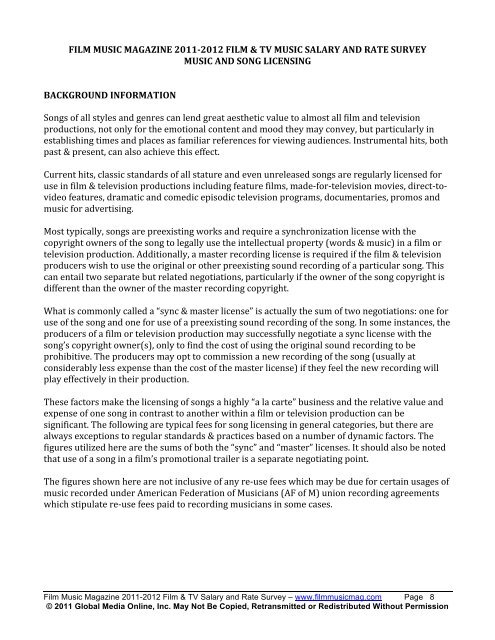Salary Survey 2011-2012 Final - Film Music Network
Salary Survey 2011-2012 Final - Film Music Network
Salary Survey 2011-2012 Final - Film Music Network
You also want an ePaper? Increase the reach of your titles
YUMPU automatically turns print PDFs into web optimized ePapers that Google loves.
FILM MUSIC MAGAZINE <strong>2011</strong>-‐<strong>2012</strong> FILM & TV MUSIC SALARY AND RATE SURVEY<br />
MUSIC AND SONG LICENSING<br />
BACKGROUND INFORMATION<br />
Songs of all styles and genres can lend great aesthetic value to almost all film and television<br />
productions, not only for the emotional content and mood they may convey, but particularly in<br />
establishing times and places as familiar references for viewing audiences. Instrumental hits, both<br />
past & present, can also achieve this effect.<br />
Current hits, classic standards of all stature and even unreleased songs are regularly licensed for<br />
use in film & television productions including feature films, made-‐for-‐television movies, direct-‐to-‐<br />
video features, dramatic and comedic episodic television programs, documentaries, promos and<br />
music for advertising.<br />
Most typically, songs are preexisting works and require a synchronization license with the<br />
copyright owners of the song to legally use the intellectual property (words & music) in a film or<br />
television production. Additionally, a master recording license is required if the film & television<br />
producers wish to use the original or other preexisting sound recording of a particular song. This<br />
can entail two separate but related negotiations, particularly if the owner of the song copyright is<br />
different than the owner of the master recording copyright.<br />
What is commonly called a “sync & master license” is actually the sum of two negotiations: one for<br />
use of the song and one for use of a preexisting sound recording of the song. In some instances, the<br />
producers of a film or television production may successfully negotiate a sync license with the<br />
song’s copyright owner(s), only to find the cost of using the original sound recording to be<br />
prohibitive. The producers may opt to commission a new recording of the song (usually at<br />
considerably less expense than the cost of the master license) if they feel the new recording will<br />
play effectively in their production.<br />
These factors make the licensing of songs a highly “a la carte” business and the relative value and<br />
expense of one song in contrast to another within a film or television production can be<br />
significant. The following are typical fees for song licensing in general categories, but there are<br />
always exceptions to regular standards & practices based on a number of dynamic factors. The<br />
figures utilized here are the sums of both the “sync” and “master” licenses. It should also be noted<br />
that use of a song in a film’s promotional trailer is a separate negotiating point.<br />
The figures shown here are not inclusive of any re-‐use fees which may be due for certain usages of<br />
music recorded under American Federation of <strong>Music</strong>ians (AF of M) union recording agreements<br />
which stipulate re-‐use fees paid to recording musicians in some cases.<br />
<strong>Film</strong> <strong>Music</strong> Magazine <strong>2011</strong>-<strong>2012</strong> <strong>Film</strong> & TV <strong>Salary</strong> and Rate <strong>Survey</strong> – www.filmmusicmag.com Page 8<br />
© <strong>2011</strong> Global Media Online, Inc. May Not Be Copied, Retransmitted or Redistributed Without Permission


